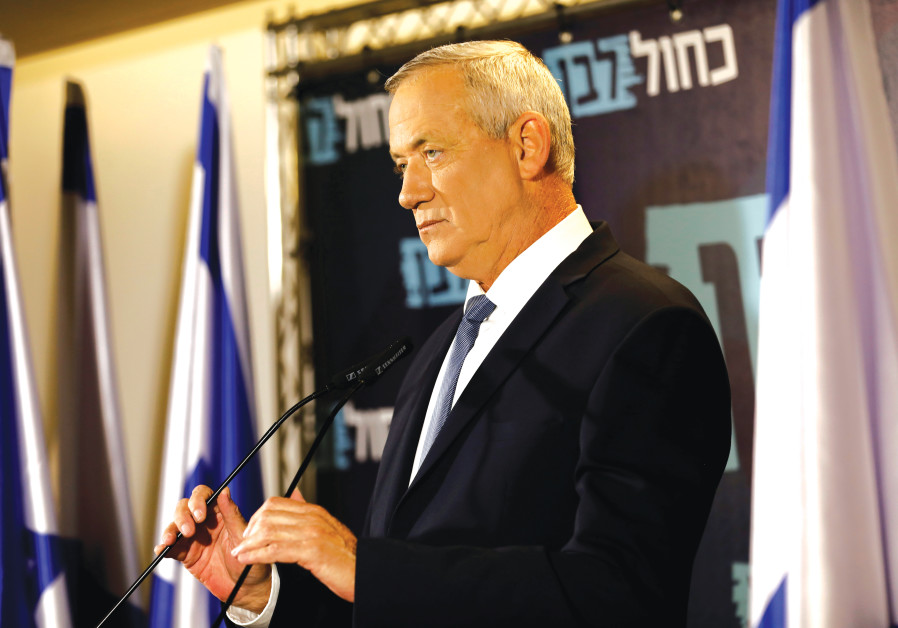 Hezbollah chief warns of civil war, says Israel exploiting Lebanon protests
Hezbollah chief warns of civil war, says Israel exploiting Lebanon protests
TOI STAFF and AGENCIES
Terror chief says though the demonstrations began spontaneously they are now being manipulated by domestic and regional rivals; Hezbollah supporters clash with demonstrators
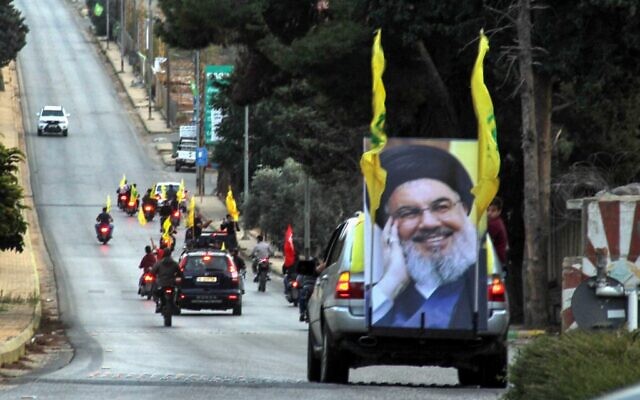 Supporters of the Hezbollah terror group drive in a convoy in support of its leader Hassan Nasrallah’s speech, in the area of Fatima’s Gate in Kfar Kila on the Lebanese border with Israel, October 25, 2019. (Ali Dia/AFP)
Supporters of the Hezbollah terror group drive in a convoy in support of its leader Hassan Nasrallah’s speech, in the area of Fatima’s Gate in Kfar Kila on the Lebanese border with Israel, October 25, 2019. (Ali Dia/AFP)
Hezbollah leader Hassan Nasrallah on Friday warned that ongoing massive anti-government protests in Lebanon could plunge the country into civil war, and accused Israel and other countries of working to take advantage of the demonstrations to fuel unrest.
The head of the Iran-backed terror organization spoke as the protests, which initially were triggered by new proposed taxes that followed public spending cuts, dragged on into a ninth day.
Nasrallah said though the protests began as a popular expression of anger against corruption and deepening economic crisis, they were now being exploited by political rivals and international and regional powers who oppose Hezbollah.
“What does it mean that the Israelis get Lebanese among those who are in the Zionist entity to the border to show solidarity with the protests,” he was quoted saying by Hezbollah’s Al-Manar television network. It was not immediately clear what he was referring to. An Iranian-armed proxy, Hezbollah seeks to destroy Israel.
In an unusual move, Nasrallah spoke with a Lebanese flag behind him instead of the Hezbollah banner.
Nasrallah warned Lebanon could descend into civil war, conjuring fear of the country’s war that lasted 15 years and ended in 1990.
“I’m not threatening anyone, I’m describing the situation,” he said. “We are not afraid for the resistance [Hezbollah], we are afraid for the country.”
#Hezbollah SG Sayyed Hasan #Nasrallah threatens those behind schemes to exploit #Lebanon‘s protests:
Resistance is the most powerful party in the country.
It’s not a problem if you get scared#نصرالله #لنحافظ_عالانجاز
He did, however, praise the protesters for pressuring the government to back away from tax hikes, but reiterated his opposition to the resignation of the cabinet.
“In view of the difficult financial, economic and living situation in the country, in view of security and political tensions that are prevailing in the region … a vacuum will lead to chaos, to collapse,” he said, according to the Reuters news agency.
Hezbollah is a major political player in Lebanon and with its allies holds the majority in the cabinet. It is the only movement not to have disarmed after Lebanon’s 15-year civil war.
Nasrallah also called on his supporters to leave the streets after clashes broke out in Beirut between them and anti-graft protesters.
Unprecedented protests have erupted in some Hezbollah strongholds, but some of its supporters have also taken offense to slogans against their leader.
In the capital’s main square, protesters fell silent to listen to Nasrallah’s speech broadcast on loudspeakers.
As it neared its end, the police moved in to separate Hezbollah supporters from the rest of the demonstrators, an AFP correspondent said.
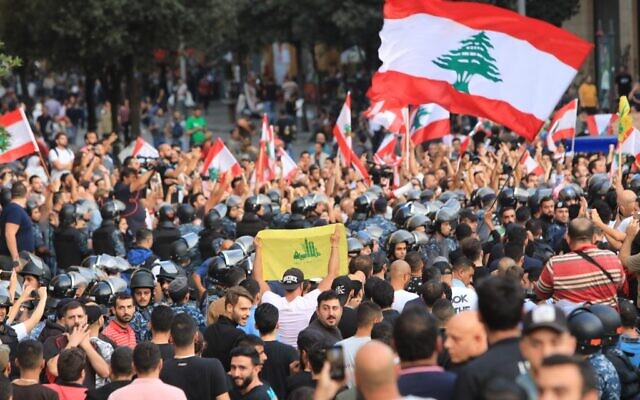 Lebanese security forces stand between Hezbollah (foreground) and anti-government protesters (background) at Riad al-Solh square in the capital Beirut on October 25, 2019. (AFP)
Lebanese security forces stand between Hezbollah (foreground) and anti-government protesters (background) at Riad al-Solh square in the capital Beirut on October 25, 2019. (AFP)
Before they retreated, Hezbollah backers threw rocks, plastics bottles and branches at the other demonstrators, who responded in kind chanting “Revolution.”
Scuffles also broke out in central Beirut before the speech, when Hezbollah supporters entered the area to reject chants against Nasrallah, who was named by the protest movement as one among the political elite who must leave.
“Nasrallah is more honorable than all of them,” the pro-Hezbollah protesters chanted. They clashed with the protesters who were previously in the square until riot police tried to break up the fight. The incidents came shortly before Nasrallah was due to speak.
Anger has been building among Hezbollah supporters because the protesters named him, along with other corrupt politicians. At least two protesters were injured. The riot police encircled the pro-Hezbollah protesters, who carried batons, separating them from the other protesters.
But tension returned when the protesters moved down the main road, lobbing stones and at one point attacking a TV crew from a station aligned with a Hezbollah rival. Some protesters chanted for calm.
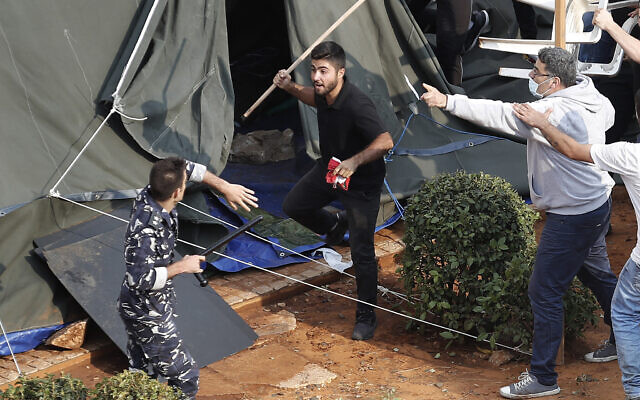 A Hezbollah supporter, right, fights with a Lebanese riot policeman, left, after a clashes erupted between Hezbollah and anti-government protesters near the government palace, in downtown Beirut, Lebanon, October 25, 2019. (AP Photo/Hussein Malla)
A Hezbollah supporter, right, fights with a Lebanese riot policeman, left, after a clashes erupted between Hezbollah and anti-government protesters near the government palace, in downtown Beirut, Lebanon, October 25, 2019. (AP Photo/Hussein Malla)
Banks, universities and schools remained closed Friday, the ninth day of nationwide protests, which initially were triggered by new proposed taxes that followed public spending cuts.
The demonstrators — who have thronged towns and cities across Lebanon — have been demanding the removal of the entire political class, accusing many across different parties of systematic corruption.
Numbers have declined since Sunday, when hundreds of thousands took over Beirut and other cities in the largest demonstrations in years, but could grow again over the weekend.
Lebanon’s largely sectarian political parties have been wrong-footed by the cross-communal nature of the protests.
Drawing in Christians and Muslims, Shiite, Sunni and Druze, the street movement has largely been peaceful — evolving into celebrations after nightfall.
Waving Lebanese national flags rather than the partisan colors normally paraded at demonstrations, protesters have been demanding the resignation of all of Lebanon’s political leaders.
“All of them means all,” has been a popular slogan.
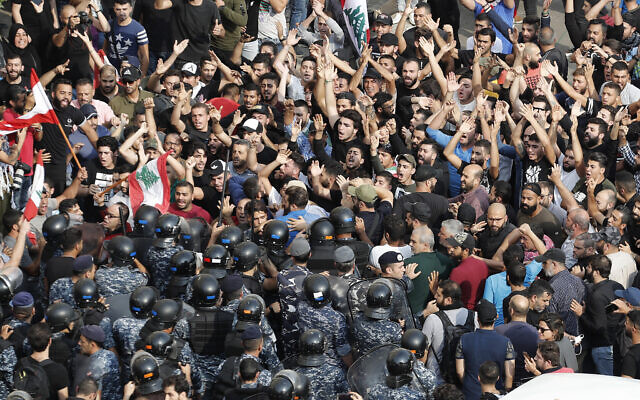 Hezbollah supporters stand in front of Lebanese riot policemen, as they shout slogans praising the terror groups leader Hassan Nassrallah, during a protest near the government palace, in downtown Beirut, Lebanon, October 25, 2019. (AP Photo/Hussein Malla)
Hezbollah supporters stand in front of Lebanese riot policemen, as they shout slogans praising the terror groups leader Hassan Nassrallah, during a protest near the government palace, in downtown Beirut, Lebanon, October 25, 2019. (AP Photo/Hussein Malla)
In attempts to calm the anger, Prime Minister Saad Hariri has pushed through a package of economic reforms, while President Michel Aoun offered Thursday to meet with representatives of the demonstrators to discuss their demands.
But those measures have been given short shrift by demonstrators, many of whom want the government to resign to pave the way for new elections.
The unprecedented mass protests come amid a deepening economic crisis in Lebanon. The country is one of the world’s most indebted nations, with public debt over 150 percent of the gross domestic product. The protesters accuse the politicians of amassing wealth even as the country gets poorer.
Zawartość publikowanych artykułów i materiałów nie reprezentuje poglądów ani opinii Reunion’68,
ani też webmastera Blogu Reunion’68, chyba ze jest to wyraźnie zaznaczone.
Twoje uwagi, linki, własne artykuły lub wiadomości prześlij na adres:
webmaster@reunion68.com









 Writer Olga Tokarczuk takes part in EXPO Krakow book fair in Krakow, Poland, on Oct. 29, 2017. Credit: Adrianna Bochenek/Agencja Gazeta/Reuters
Writer Olga Tokarczuk takes part in EXPO Krakow book fair in Krakow, Poland, on Oct. 29, 2017. Credit: Adrianna Bochenek/Agencja Gazeta/Reuters
